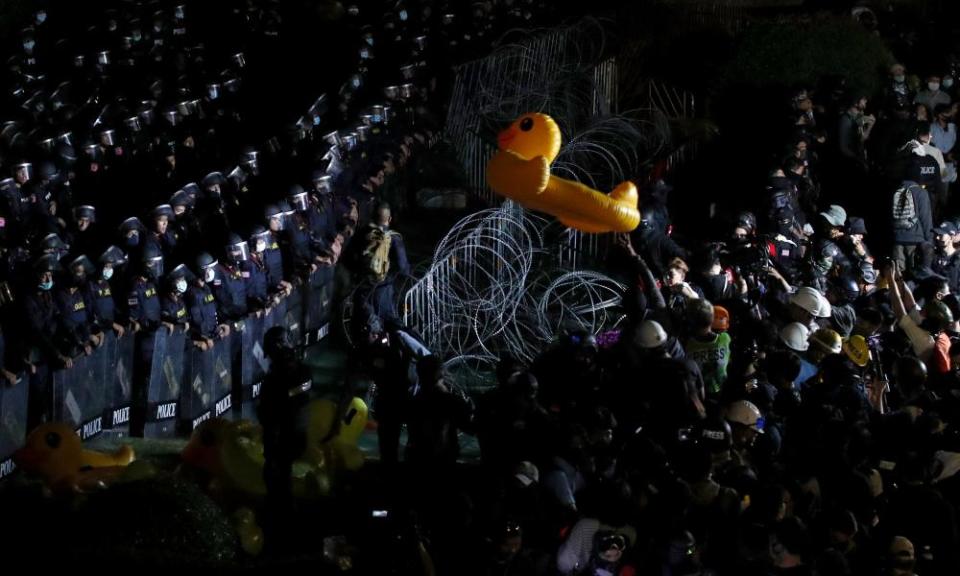Thai protesters march to royal guard barracks in Bangkok

Thousands of protesters marched to a barracks belonging to Thailand’s royal guards in Bangkok on Sunday, demanding that King Maha Vajiralongkorn give up control of some army regiments, the latest show of defiance against the country’s powerful monarchy and the military.
The protest comes after days of rallies in the Thai capital, where a student-led pro-democracy movement that emerged in July has intensified pressure on the establishment. Over recent months, demonstrators have shaken the country by criticising the monarchy, an institution protected by a harsh defamation law, and demanding the king relinquish some of his vast power and wealth.
On Sunday evening, protesters marched to the 11th Infantry Regiment, one of two army units that the king brought under his direct command in 2019.
In a statement, protesters accused the king of having “expanded his royal prerogative in every way possible including [through] the military” and referred to the prime minister, Prayuth Chan-ocha, a former army general, as the king’s “royal puppet”. Copies of the statement were folded into paper planes and flown in the direction of riot police who stood guard outside the barracks.
Protesters later splashed red paint on the ground in front of officers, referencing the deadly army crackdown on anti-government redshirt demonstrators in 2010. The army base was barricaded with buses, which were removed by protesters, as well as loops of barbed wire. Many on the frontline wore gas masks and hats for protection, though the evening passed peacefully.

Above their heads, protesters carried a flock of giant inflatable ducks, which have emerged as an icon of the movement after they were used by demonstrators to shield themselves from water cannon.
Yellow ducks can be seen everywhere at recent rallies: fixed on the top of protesters’ protective hard hats, sold on souvenir stalls and worn on hair slides. At one protest last week, protesters even gave out coupons that featured a duck wearing a crown, which could be exchanged for street food.
The authorities have responded to the recent protest movement by reviving the country’s strict lese-majesty law, reportedly summoning as many as 15 protesters to answer charges in the last week alone. Under the law, anyone who “defames, insults or threatens the king, queen, heir-apparent or regent” can face up to 15 years on each charge.
Among those facing charges is Parit Chiwarak, known also as Penguin, who has been accused over comments made at previous rallies. On Sunday, he challenged the king’s military power. “An army should belong to the people, not the king,” he said. “In a democratic system, the king is not responsible for directing command of the military.”
Strict lèse majesté laws make it a crime to criticise, defame or insult members of Thailand's royal family.
In practice, this means open discussion or critical reporting about the royal family is considered illegal.
The military junta, which seized power in 2014, has been criticised for using the law – which can see people jailed for up to 15 years on each count – to stifle opposition.
In 2015, a man was jailed for 30 years over six Facebook posts and the local printer of the New York Times refused to publish an edition with a story on the king.
Vajiralongkorn succeeded his father, King Bhumibol Adulyadej, in 2016, and has since asserted his authority, including by taking direct control of a palace fortune worth tens of billions of pounds. Last year, the 1st and 11th Infantry regiments were brought under his direct control, allowing him to sidestep the usual military chain of command.
Protesters said they had also decided to target the regiment over its role in previous coups, and in the suppression of anti-establishment protests 10 years ago.
About 90 people were killed in 2010 after the army launched a crackdown on protesters who had demonstrated on the streets for months. The military denies having used excessive force.
The recent pro-democracy movement argues that the royal family – and the military, with which it is closely aligned – must be transparent and accountable to the people if Thailand is to have a true democracy.
They have made three demands: reform of the monarchy, a new constitution, and the removal of Prayuth, who first came to power in the 2014 coup. Prayuth has refused to step down.
The palace has not commented on the protests, though the king said that he loves demonstrators “all the same”.
In a recent statement, the foreign ministry has stated that last week, protesters were able to exercise their rights to freedom to peaceful assembly “without any hindrance”.
The statement added that protesters must exercise their rights “in accordance with the relevant laws”.

 Yahoo Finance
Yahoo Finance 